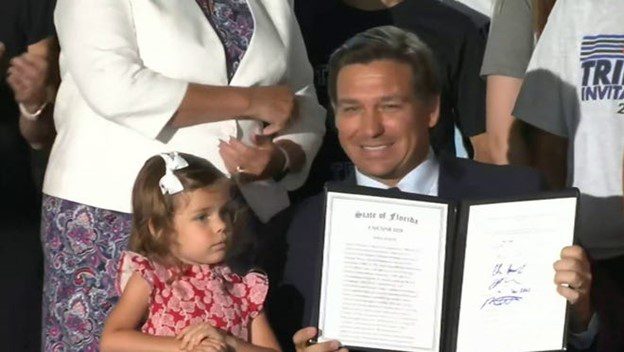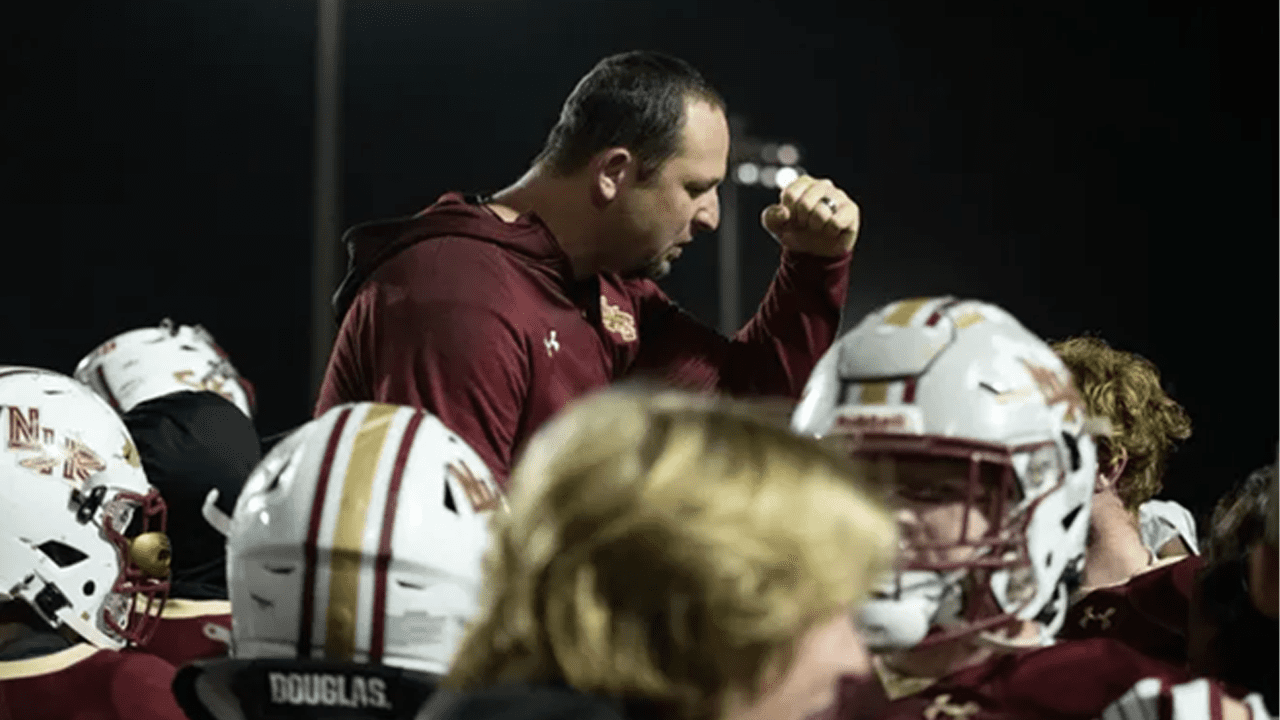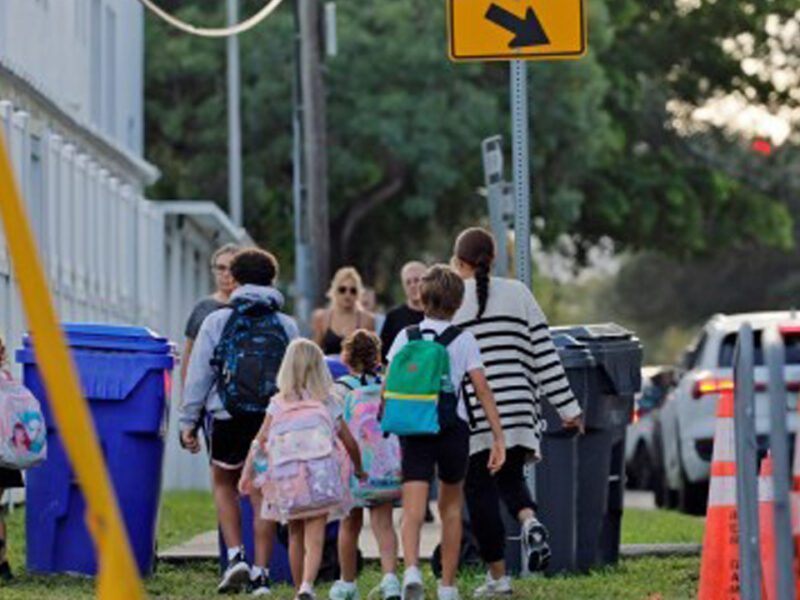Pre-high school game prayer law goes into effect in Florida. Its controversy continues.
Tallahassee Democrat | By Douglas Soule | July 5, 2023
TALLAHASSEE — Saturday marked the start of more than just the Fourth of July weekend.
Also setting off fireworks were a slew of bills passed during the 2023 legislative session that went into effect the same day, including a law making marked changes to the Florida High School Athletic Association, which regulates most of the state’s high school sports.
While those changes, like empowering the governor to appoint the majority of the organization’s board, will reverberate across the state’s athletic scene, one provision in particular has gained the attention of more than just sports’ enthusiasts.
House Bill 225 requires the FHSAA to allow high schools participating in championship games or series to make brief opening remarks.
While not explicitly written in the law, it’s no secret this is about prayer before those games, a topic that religious liberty and First Amendment advocates and attorneys have debated and litigated for years. And the road ahead may still be rocky with controversy, with nothing close to consensuses cemented between those pro-pregame prayer and those against.
“[It] preserves the First Amendment right to speech, including public prayer, at the beginning of high school sporting events,” Gov. Ron DeSantis said about the bill before he signed it into law in mid-May at Cambridge Christian School.
“You have a right to free expression of religion,” he said. “If government is denying your right to say a prayer before a game, they are infringing your speech.”
Years of debate and litigation
There’s a reason DeSantis chose Cambridge Christian School for the bill-signing ceremony.
The school has been rallying back and forth in the courts with the FHSAA since 2016, when it sued the organization in the U.S. District Court for the Middle District of Florida.
The school in part argued the organization had violated its free-speech and free-exercise constitutional rights the year before by not allowing a prayer over the loudspeaker before its football championship game in Orlando’s Camping World Stadium.
The FHSAA too cited the First Amendment in its counterargument. The amendment partly states: “Congress shall make no law respecting an establishment of religion, or prohibiting the free exercise thereof.”
FHSAA homed in on that first part, “respecting an establishment of religion,” claiming using a loudspeaker for the prayer would’ve counted as an unconstitutional state endorsement of a religious message.
In 2017, a district judge sided with FHSAA, saying the organization is a state actor and could not endorse prayer, but the appeals process has kept the case chugging along. The sides gave arguments to the 11th U.S. Circuit Court of Appeals just last week.
What happens now?
During the bill-signing ceremony, Head of School Shawn Minks appeared at the podium with a smile.
“After today, schools will be allowed to make opening remarks before state championship games, supporting important principles of free speech that have made this nation great,” Minks went on to say.
“I don’t know what other schools or students will say during those opening remarks,” he said. “That’s up to them. But I do know that the next time Cambridge Christian returns to play for a state championship – and we will return – we will pray over the loudspeaker before kickoff.”
But, during the appeals hearing last week, an attorney for the school expressed less optimism.
“As far as we can tell, the prayer ban is still in place,” said Jesse Panuccio, an attorney with the firm Boies Schiller Flexner, which is representing the school.
In an interview with the USA TODAY NETWORK-Florida, Jeremy Dys, senior counsel for the First Liberty Institute and an attorney for Cambridge Christian Schools, asserted the athletic association has “not abandoned” a belief that the First Amendment’s Establishment Clause prevents loudspeaker prayer, and the clause overrides state law.
At the hearing, an attorney representing the organization denied there would be any such ban.
“The plain text of the new statute doesn’t have any exclusion for prayer, and I don’t think there’s any reason to believe the association would create one,” said Daniel Mahfood of the firm Holland & Knight. “So if a school wants to say a prayer, by law now they have that right.”
Ryan Harrison, the FHSAA’s public relations specialist, doubled down on this in an email.
“The law created by HB 225 makes a few exceptions to the right of a school to make remarks before a contest over the loudspeaker,” Harrison said. “None of those exceptions include a prayer. So, as far as FHSAA is concerned a prayer may be made over the loudspeaker before a contest without any consequence from the FHSAA.”
The opening remarks can’t be longer than two minutes per school, according to the law, which prevents the athletic association from controlling, monitoring or reviewing the opening remarks or who gives them.
Those remarks also can’t be “derogatory, rude or threatening,” and they must be preempted by an announcement that they’re not endorsed by the athletic association.
As for what happens before regular season games, Harrison said since FHSAA does not conduct them, it has no control over their loudspeaker systems. “Decisions as such during the regular season are a school-based decision,” he said.
Still, the law additionally states schools can allow opening remarks before regular season games at their own discretion.
Ryan Jayne, senior policy counsel for the Freedom From Religion Foundation, said the loudspeaker prayers are “exclusionary toward non-religious students who are attending or participating in the event.”
But he said he would expect those prayers to come from private, religious schools.
“I am pretty much guaranteeing [any public school that does a prayer is] going to get sued, and they’re going to be having a very tough time in court,” Jayne said. “It’s well-established that public schools must be secular.”
Jayne added, though, that there’s a new landscape, due to last year’s Supreme Court decision backing a Washington state former high school football coach after he lost his job for offering post-game prayers – despite school district objections that students felt compelled to take part.
“Respect for religious expressions is indispensable to life in a free and diverse republic – whether those expressions take place in a sanctuary or on a field, and whether they manifest through the spoken word or a bowed head,” wrote Associate Justice Neil Gorsuch in a 6-3 majority opinion. “Here, a government entity sought to punish an individual for engaging in a brief, quiet, personal religious observance doubly protected by” the First Amendment.
Still, Jayne says if a coach believes the decision gives them a green light to “push religion,” they’ll be inviting a tough-to-defend lawsuit. And he said those defending the new statute using the First Amendment are “missing the point.”
“It’s an assault on religious liberty because it allows people on behalf of the state to impose religion onto others,” he said.
But Dys of the First Liberty Institute thinks public schools should be safe to use a prayer on the loudspeakers.
“We’ll have to see how that turns out, but I think it’s going to be the speech of the individual speaker,” he said. “So the individual is not representing the school. They’re providing a forum for the people to make the remarks, so it’s an individual’s speech.”
David Williamson, a co-founder and director of the Central Florida Freethought Community, said denying loudspeaker prayer didn’t deny anyone their First Amendment rights.
“No private, religious school has a constitutional right to take the microphone out of the hands of a state actor, like FHSAA, so they can proselytize to the crowd,” he said. “Because there aren’t many Jewish, Muslim or other non-Christian private schools, this law will allow Christians to carry out their biblical duty to convert everyone to their religion, one that needs to be propped by the government in order to thrive.”

Gov. Ron DeSantis was joined by daughter, Madison, when he signed bill banning transgender females from playing women or girl’s sports. File
Why the FHSAA changes?
Before signing the bill giving him majority control of the FHSAA, DeSantis didn’t go easy on the organization.
He not only bashed the association for its pre-game prayer opposition, but he also accused the FHSAA of taking too long to implement a law, which he signed on the first day of Pride Month in 2021, banning transgender athletes from participating in women’s sports.
He then criticized the organization for a cautious approach to athletic activities early in the COVID-19 pandemic. DeSantis credited his own team with saving the fall 2020 sports seasons.
“I just look back, and I’m like, ‘There needs to be changes to this organization, when you have that type of advice coming in, that was just so detached from reality, and was really more based on hysteria than based on sound science,’” he said.
Those changes also include expanding a student’s choice on where they can compete, such as by allowing those who are home-schooled or in private school to join public school sports teams and other extracurricular activities.






